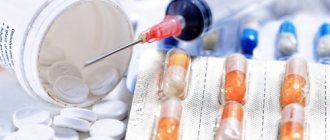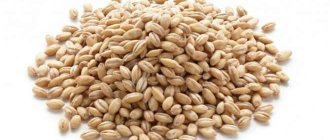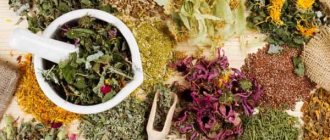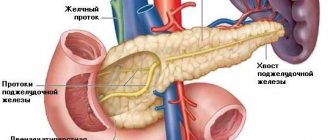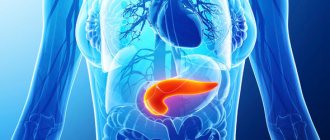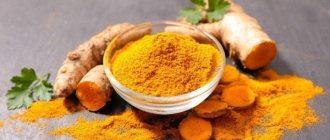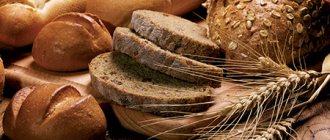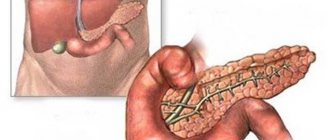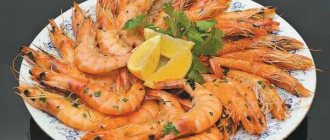The role of the pancreas and the most common diseases
The pancreas is part of the endocrine system
. Takes part in the digestion process and produces the necessary enzymes. These enzymes break down fats, proteins, and carbohydrates to facilitate intestinal absorption and neutralize the acidic gastric environment.
Common diseases associated with pancreatic dysfunction:
- acute or chronic pancreatitis;
- pancreas cancer;
- diabetes;
- cystic fibrosis;
- cyst;
- lipomatosis;
- necrosis of gland tissue.
Symptoms:
- paroxysmal pain syndrome;
- constant pain that intensifies after overeating, alcohol, fatty, fried, spicy foods;
- nausea, vomiting;
- diarrhea;
- lack of appetite.
For prevention
To avoid exacerbation of chronic inflammation of the pancreas, it is necessary to regularly take enzyme agents that normalize the digestion process and relieve the organ.
To achieve maximum therapeutic effect, they should be consumed with meals.
If discomfort in the abdominal region and dyspepsia occur, it is recommended to use anticholinergics (Duspatalin) and antacids. Some patients are prescribed choleretic drugs (Allohol), intended to normalize the outflow of bile and reduce the secretory load on the pancreas.
It is prohibited to use medications uncontrollably not only during exacerbation of pancreatitis, but also during periods of stable remission. To prevent the recurrence of the disease, it is important to strictly follow the recommendations of your doctor.
What medications should be used to treat the pancreas?
Drug therapy is designed to eliminate the primary causes that led to the development of inflammation in the pancreas, as well as:
- relieve pain;
- restore digestive function (compensate for enzyme deficiency, restore microflora);
- compensate for endocrine insufficiency.
These goals are achieved with the help of well-known drugs that restore the functioning of the pancreas.
All medications have contraindications; you cannot diagnose yourself and choose therapy on your own!
Antibacterial drugs
To relieve inflammation, doctors prescribe antibiotics. These medications are designed to prevent possible complications ( peritonitis, abscess, sepsis
).
Broad-spectrum agents are effective: Abactal, Vancomycin, Ceftriaxone
.
| Name | Properties | Contraindications | How to use? |
| Abaktal | Effective against gram-positive and gram-negative microorganisms, has a bactericidal effect. | hypersensitivity to antibiotic components; pregnancy; organic lesions of the central nervous system; impaired kidney function. | Take during or after meals, dividing the daily dose into two parts. Maintain equal intervals of time. If liver function is impaired, use in the form of a solution for infusion is recommended. The solution is administered slowly by dropper. 1 g is the maximum daily dose. |
| Vancomycin | Destroys bacteria, the cellular structure of pathogenic microorganisms. Effective against staphylococci, streptococci. | Hypersensitivity to the components of the drug. Prescription for pregnant women and lactation is not recommended. | Prescribed 1-2 g per day. It is administered intravenously. |
| Ceftriaxone | Inhibits the synthesis of the cell membrane of many gram-positive and gram-negative bacteria. Third generation antibiotic. | Allergies, urticaria and intolerance to cephalosporins and penicillins, pregnancy. Do not mix with other antibiotics in one bottle or syringe. | Usually administered intravenously or injected intramuscularly at 1-2 g per day every day. If the infection is severe, the dose is increased. |
Enzyme products
Treatment of pancreatitis should be accompanied by the use of enzymes that normalize digestion
.
They do not restore organ function, but deliver to the body substances necessary for proper digestion and absorption of fat-soluble vitamins.
The dosage is prescribed by a doctor; incorrect use of antibiotics will harm your health.
If the pancreas is unable to secrete a sufficient amount of enzymes, they are purchased at the pharmacy and taken orally when eating fatty foods. If the exocrine function is too severely impaired, they are drunk even when eating harmless food.
Enzymes are obtained from animal organs. The active ingredient is pancreatin. List of products containing pancreatin:
- mezim;
- festal;
- pangrol;
- Creon;
- pancreaon;
- enzistal;
- Pancreatin.
To prevent the destruction of pancreatin in gastric juice
medications are enclosed in an enteric coating. It is dissolved by the alkaline environment of the duodenum.
Afterwards the enzymes are released and their action begins.
Possible nausea and allergies after taking.
The products are produced in the form of capsules that contain microgranules with pancreatin, as well as in the form of tablets. Capsules have a higher price, but manufacturers claim that they are more effective and mix better with food.
Antispasmodics, analgesics
This group of drugs includes drugs with an effect aimed at eliminating spasms of the intestinal muscles:
- No-shpa;
- Papaverine.
And mixed drugs. They contain painkillers:
- Atropine;
- Gastrocepin;
- Platyfillin.
In the presence of attacks of pancreatitis, medications relieve pain. The doctor selects medications, taking into account the intensity of pain: analgesics (Baralgin, Pentazocine), narcotic analgesics (Promedol, Tramal).
Effective antacids
If pancreatic disease is accompanied by exocrine insufficiency, pain and dyspeptic syndrome occur. In such cases, antacids are also used. These medications suppress the secretion of hydrochloric acid, bind hydrochloric acid and neutralize it.
Phosphalugel, Maalox, Almagel other antacid suspensions
reduce the acidity of the gastric environment, reduce the amount of destroyed enzymes, provide the gland with functional rest and its accelerated recovery. Typically, such drugs envelop the mucous membrane of the organ, protecting it from the aggressive effects of digestive juice. Effective for digestive disorders and food poisoning.
Thanks to the sorbing effect, these agents bind pathogenic microorganisms, toxic substances, and gases, removing them from the body. They do not lead to strong alkalization of the body and do not increase the production of hydrochloric acid in response to its neutralization.
Omeprazole and other drugs
Rabeprazole, Lansoprazole, Famitidine are prescribed as antisecretory drugs
. One of the most effective is Omeprazole. This drug quickly eliminates pain during exacerbation of chronic pancreatic diseases. Refers to proton pump inhibitors that reduce acid production.
Eliminates the pathogenic microorganism Helicobacter pylori. Reduces the severity of symptoms, reduces the likelihood of relapse of the disease with complications. Relieves the condition within two hours.
Cannot be taken with:
- hypersensitivity to components;
- pregnancy, lactation;
- gastritis with low acidity;
- oncology of the digestive tract;
- osteoporosis;
- gastrointestinal infections;
- liver failure.
In combination with other drugs, drugs are prescribed that relieve negative symptoms in the gastrointestinal tract and the body in general:
- Hilak Forte and Smecta are effective against diarrhea and dysbacteriosis;
- activated carbon, Enterosgel, will help against intoxication;
- if intestinal motor function is impaired, you need to take Trimedat, which stimulates the muscles of the organ.
Analgesics
The use of analgesics during exacerbation of chronic pancreatitis or other diseases is aimed at relieving or reducing pain.
You can take the following tablets for pain in the pancreas:
- Baralgin;
- Analgin;
- Paracetamol;
- Ibuprofen;
- Acetaminophen;
- Diclofenac.
These tablets should be used only in emergency cases; systematic use (more than 5 days in a row) is unacceptable. You should not take analgesics for pain relief that have a pronounced toxic effect on the liver, since chronic pancreatitis already provokes damage to its tissues due to stagnation of bile.
Treatment with folk remedies
Traditional medicine in combination with drug therapy will speed up recovery and alleviate the patient’s condition. The following recipes will help:
- You need to drink 100 ml of infusion from the leaves of strawberries, lingonberries, blueberries, and corn silk. The components are taken in equal parts, crushed, and poured with a glass of hot water. Leave overnight.
- Various herbs are very effective. You need to drink 50 g of iris and wormwood decoction for a week.
- Stir a tablespoon of flour in a glass of kefir, eat the mixture in the morning, replacing breakfast with it.
- Take 30 drops of Rhodiola rosea tincture before meals.
- The parsley is washed, placed on the bottom of the pan, milk is added, which should cover the greens completely. The dishes are placed in the oven. The milk should melt, but not boil away. Strain. Take two tablespoons every hour. The product must be drunk completely the day before. It is an effective diuretic. It has a beneficial effect on the pancreas and can refresh and improve complexion.
- Herbal mixture also helps: coriander, St. John's wort, dried herb, dill seeds, elecampane root, peppermint leaves are mixed in equal proportions. A tablespoon of the mixture is poured into a glass of boiling water, left for an hour, and drunk several times a day.
- Hercules is boiled in water. No salt or oil is added. The porridge should be liquid. Eat small portions all day.
Antacids
For pain in the pancreas, agents are often used that neutralize hydrochloric acid produced by the lining cells of the stomach (antacids) or reduce its secretion. They prevent irritation and ulceration of the mucous membrane, increase the activity of enzyme preparations that are unstable to the acidic environment of the stomach, protecting them from digestion.
Antacids that are taken for pain in the pancreas include:
- Maalox;
- Almagel;
- Phosphalugel.
Maalox suspension
Among the drugs that reduce the secretion of hydrochloric acid, proton pump inhibitors (Omeprazole, Omez, Gastrozol) or H2-histamine receptor blockers (Ranitidine, Famotidine) are used.
Pancreatitis - what is this disease?
Pancreatitis refers to severe pathologies characterized by inflammation of the pancreas tissue. It is located in the upper part of the abdomen, tightly adjacent to the stomach, its back wall. The gland produces enzymes that, together with bile in the duodenum, digest food debris. It also secretes hormones important for maintaining blood sugar levels - insulin and glucagon.
It should be noted that the pancreas plays a huge role in the functioning of the body, and its inflammation is extremely undesirable. If enzymes do not enter the intestine, they become active and begin to eat pancreatic cells, and all this can end in disaster.
The disease develops more often in the male half of the population, because they drink alcohol more than women.
In women, pancreatitis is more often formed due to the development of cholelithiasis. These are the two main factors influencing the development of pancreatitis. In addition to these, there are other reasons for the development of this disease:
- Obesity.
- Pathologies of the liver, stomach, including ulcers and cholelithiasis.
- Constant consumption of fatty, spicy foods, carbonated water, mayonnaise and fast food.
- Treatment with certain hormonal agents and antibiotics.
- Surgical interventions in the abdominal area or trauma, for example, bruise or injury.
- Complications after infectious diseases: mumps, viral hepatitis B and C.
- Helminthic lesions: opisthorchiasis or giardiasis.
- Tumors or abnormalities of the gland.
- Hereditary predisposition.
Inflammation of the pancreas is also common in children who prefer to eat sweets, chips and other harmful delicacies. The presented products irritate the walls of the stomach, causing the entire digestive tract to suffer.
First aid: relief of acute pain
If any signs indicating pancreatitis occur, you should immediately seek medical help, because For proper treatment, it is necessary to establish the cause of the disease and the degree of damage. Self-medication can be harmful in some cases.
But first aid can and should be provided:
- A cold heating pad or other cold object should be applied to the sore area. This will relieve swelling, resulting in less pain.
- The patient needs to be ensured maximum rest: any movements can increase pain and discomfort.
- It is recommended to drink more liquid, namely alkaline mineral still water. It will ensure the outflow of pancreatic juice.
- To relieve spasms, you can take painkillers such as No-shpa and Papaverine.
- During an exacerbation, you need to refuse any food.
- Completely eliminate smoking and drinking alcohol.
General information
Pancreatitis is a serious disease in which the cells of the pancreas undergo inflammatory processes, leading to disruption of their functioning. There is a decrease in the synthesis of insulin, glucagon and c-peptide, which causes metabolic disorders, which affect the functioning of all internal organs and the entire body as a whole.
At the same time, the inflammatory processes themselves lead to spasms in the pancreatic ducts, as a result of which their lumen narrows and digestive enzymes, which should be released into the duodenum, remain in the pancreas, triggering self-digestion processes in it. And this provokes the occurrence of an acute pain syndrome, which literally fetters the patient and puts him in a hospital bed.
If acute inflammatory processes in the pancreas occur for more than 3-5 months, the disease takes on a chronic form. In this case, a person experiences painful attacks every time as soon as any negative factor begins to affect the body.
The development of pancreatitis and its exacerbation most often occurs for the following reasons:
- frequent consumption of fatty and fried foods;
- abuse of alcoholic beverages (and in people suffering from pancreatitis, its exacerbation can be provoked by the consumption of even 50 g of weak alcohol);
- smoking;
- stress;
- other gastrointestinal diseases;
- oncology.
Pancreatitis has different forms of development and requires an individual approach to treatment.
If we talk about the symptoms of pancreatitis, we should highlight the following:
- pain in the right or left hypochondrium;
- attacks of nausea and vomiting;
- bowel dysfunction (constipation is observed in the chronic course of the disease, diarrhea in the acute course);
- change in stool character (stool becomes greasy);
- weakness;
- increase in temperature (with acute pancreatitis).
It should be noted that with the development of acute inflammatory processes, the clinical manifestations of pancreatitis are pronounced, and with chronic ones, the symptoms become less acute and occur only under certain conditions.
